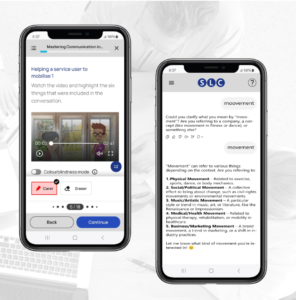
SLC win Ufi grant to develop AI language learning app for social carers
We’re delighted to have won a grant from Ufi VocTech Trust to develop an AI-driven technology solution that provides cheap phone-based language and communication skills

In the world of healthcare, effective communication between healthcare professionals and patients is paramount. However, conducting interviews with patients can often be a challenging task, especially when you’re unsure of where to begin.
In today’s article, we’ll explore different ways of gathering critical information efficiently while helping you establish rapport with your patients.
When interviewing patients, the questions you ask can significantly impact the quality of the information you receive.
Using appropriate questions will also help put the patient at ease and enable you to find out the information you need in an effective and respectful manner.
Let’s look at some types of questions and information-gathering techniques you can use to navigate these conversations effectively.
Open questions encourage patients to freely share their experiences and concerns.
Beginning your conversation with open questions helps to establish a comfortable rapport.
Examples of open questions include:
From open questions, you can then move to closed questions which are designed to elicit specific, concise answers.
Examples of closed questions include:
Using questions with options can guide patients to provide detailed and relevant information.
This approach can be especially helpful when you need to narrow down symptoms or possible causes.
Examples of questions with options include:
Summarising involves repeating and condensing information given by the patient.
It not only helps check the accuracy of the information but also gives patients an opportunity to clarify or expand on their responses.
Example of summarising include:
Indirect questions can help you maintain an appropriate level of formality and soften potentially sensitive inquiries during patient interviews.
Here are some examples of changing direct questions into indirect ones.
Funnelling questions are a strategic approach to patient interviews.
Begin with open questions to initiate the conversation and get a broad idea of the patient’s concern, then progress to more focused questions, ending with closed questions for more detail.
Here’s an example.
So, successful patient interviews use a range of question types.
Open questions establish rapport, closed questions find out specific information, questions with options guide responses, and summarising allow you to check information and patients to add anything they feel is missing.
Using indirect questions for sensitive or personal topics can help patients feel more at ease.
Combining all of these into a set of funnelling questions can help you get a more complete picture of the patient’s situation and concerns.
Watch this video featuring SLC teacher Alexia Sporidis as she provides the best tips to interviewing patients in English:
We are Medical English, OET and IELTS preparation specialists. Our uniquely effective course design and delivery offers an unparalleled range of Medical- and exam-focused courses and tests.
Explore our courses:

We’re delighted to have won a grant from Ufi VocTech Trust to develop an AI-driven technology solution that provides cheap phone-based language and communication skills

We’re delighted to announce a partnership with leading Medical English app, Doxa.

Back to Menu ↩ What is the UK Foundation Programme? The UK Foundation Programme is a two-year, structured, work-based training programme which is designed to
Get updates and get the latest materials on Medical English, OET and IELTS
